
PRAISE FOR
The Flip
In The Flip, Jeffrey J. Kripal reflects deeply on non-ordinary experiences that transform peoples way of understanding themselves and the world. The result is an eminently readable manifesto for the role of the humanities in integrating emergent thought in many domains. Bradley Lewis, author of Narrative Psychiatry: How Stories Can Shape Clinical Practice and Depression: Integrating Science, Humanities, and Culture
Kripal is one of the most important voices pushing the academy to broaden its perspective beyond the secular: to take seriously the idea that reality is more complex. He is slowly winning the argument and changing the terrain of debate without making an argument for any one religion. This is a remarkable achievement. The Flip is worthy of a wide readership. T. M. Luhrmann, author of When God Talks Back and Our Most Troubling Madness
The Flip lucidly lays out a way of thinking about the enfolding of mind and reality that is at once empirically scientific and at the same time consistent with all we know from some of our most sophisticated philosophical and spiritual traditions. Kripal provides a practical guide to a deeper and more effective understanding of ourselves and our world. Read this book if you want to actively contribute to the development of a worldview that will be of extraordinary benefit to humankind and our planet. David E. Presti, author of Foundational Concepts in Neuroscience and Mind Beyond Brain
Offers plenty of points to ponder. Kirkus Reviews
Makes the baffling notions of quantum mechanics and neuroscience digestible. In this respect, The Flip is similar to The Lives of a Cell: Notes of a Biology Watcher by Lewis Thomas. The Flip did open my mind to the fact that there are leading experts in both the field of science and religion (Kripal himself) who are pushing toward unification and the extinction of out-dated knowledge. NewPages
PRAISE FOR
Jeffrey J. Kripal
[Kripal offers] a genuinely hopeful vision of what we yet could be in the mirror of what we have been. Deepak Chopra
[Kripal] effortlessly synthesiz[es] a dizzying array of dissonant phenomena (Cold War espionage, ecstatic religiosity), incongruous pairings (Darwinism, Tantric sex), and otherwise schizy ephemera (psychedelic drugs, spaceflight) into a cogent, satisfyingly complete narrative. That he reconciles all this while barely batting an eye is remarkable; that he does so while writing with such lan is nothing short of wondrous. Atlantic
Kripals work is playful, engaging and original. His references to both high and low culture are reminiscent of prominent intellectuals such as Susan Sontag and Slavoj iek. Times Higher Education
[Kripal] is a serious intellectual, but one who wears his heart on his sleeve. He writes with sensitivity and self-deprecating humor. New York Journal of Books
Kripals writing glows with insight and enriches our understanding of humanitys gnostic dignity. Library Journal
[Kripal] is an engaging storyteller. Publishers Weekly
Kripal has one of the most distinctive, interesting voices in the humanities today. Choice
According to Kripal, mysticism is very much a praxis, a set of techniques that lead to a goal, inner depth and self-knowledge. [His work] can bring much-needed clarity and depth, and no little intelligence, to the subjectivity wars of postmodernity. Journal of Religion
[Kripal] make[s] the case that excluded, silenced, lost perspectives need to be heard in twenty-first century academe and also in our spiritual quests. Harvard Divinity Bulletin
[Kripals work] suggests methodologies that can integrate the humanities and the sciences, the brain/mind distinctions, contemporary neuroscience, and psychical research. Journal of Contemporary Religion
THE FLIP
Epiphanies of Mind and the Future of Knowledge
JEFFREY J. KRIPAL
BELLEVUE LITERARY PRESS
New York
First published in the United States in 2019 by Bellevue Literary Press, New York
For information, contact:
90 Broad Street
Suite 2100
New York, NY 10004
www.blpress.org
2019 by Jeffrey J. Kripal
Library of Congress Cataloging-in-Publication Data
Names: Kripal, Jeffrey J. (Jeffrey John), 1962- author.
Title: The flip : epiphanies of mind and the future of knowledge / Jeffrey J. Kripal.
Description: First edition. | New York : Bellevue Literary Press, 2019. | Includes bibliographical references.
Identifiers: LCCN 2018021661 (print) | LCCN 2018038244 (ebook) | ISBN 9781942658535 (ebook) | ISBN 9781942658528 (trade paperback)
Subjects: LCSH: Religion and science. | Spirituality.
Classification: LCC BL240.3 (ebook) | LCC BL240.3 .K74 2018 (print) | DDC 128/.2--dc23
LC record available at https://lccn.loc.gov/2018021661
All rights reserved. No part of this publication may be reproduced or transmitted in any form or by any means, electronic or mechanical, including photocopy, recording, or any information storage and retrieval system now known or to be invented, without permission in writing from the publisher, except by a reviewer who wishes to quote brief passages in connection with a print, online, or broadcast review.
Bellevue Literary Press would like to thank all its generous donorsindividuals and foundationsfor their support.
Book design and composition by Mulberry Tree Press, Inc.
Bellevue Literary Press is committed to ecological stewardship in our book production practices, working to reduce our impact on the natural environment.
 This book is printed on acid-free paper.
This book is printed on acid-free paper.
Manufactured in the United States of America.
First Edition
1 3 5 7 9 8 6 4 2
paperback ISBN: 978-1-942658-52-8
ebook ISBN: 978-1-942658-53-5
An era can be considered over when its basic illusions have been exhausted.
ARTHUR MILLER
Contents
THE FLIP
PROLOGUE:
THE HUMAN COSMOS
Hydrogen is a light odorless gas that, given enough time, turns into people.
ANONYMOUS
T his little book is about many things. It is a report on the state of knowledge about the nature of mind and its relationship to matter, including the matter of the brain. It is an ironic, affectionate observation about how much visionary literature the scientific and medical professions have helped produce over the last century (think of the literature on the philosophical implications of quantum mechanics, on the near-death experience, on savant phenomena, and on psychedelic molecules). It is also a designed polemic and public complaint about the dangerous disregard for the humanities in contemporary culture, academic and otherwise. In the end, though, it is mostly an inappropriately hopeful, if not wildly optimistic, essay about a tipping point, about the futurebe it near or farof a new worldview, a new real that is presently forming around the epiphany of mind as an irreducible dimension or substrate of the natural world, indeed of the entire cosmos, before and beyond any present scientific, ethnic, political, or religious story that one happens to find oneself (caught) in at the moment.
Next page
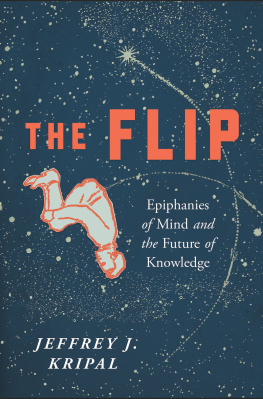


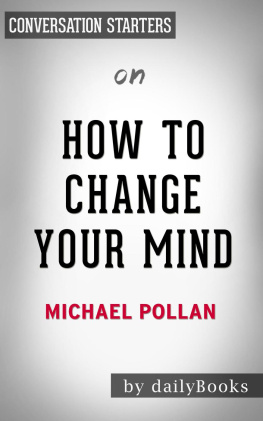

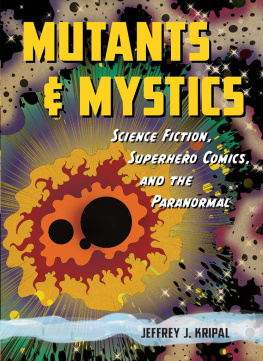
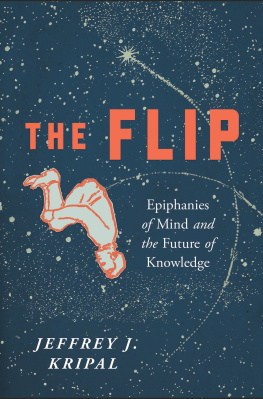


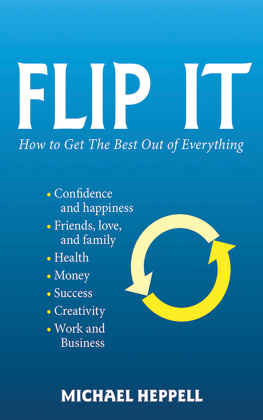




 This book is printed on acid-free paper.
This book is printed on acid-free paper.